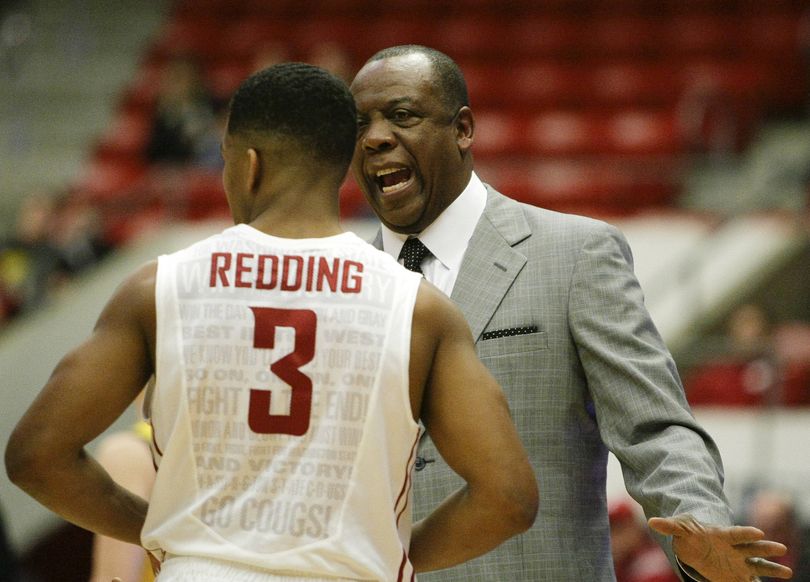Ernie Kent doesn’t see freshman ineligibility on the horizon

The idea of reverting back to an old NCAA rule that prohibited athletes from competing as freshman may seem outlandish, but it has some big endorsers.
Last year the Pac-12 presidents pledged to consider restoring the rule for men's basketball to combat the one-and-done trend, while couching it by saying that they would prefer the NBA and players' union raise the age minimum.
In fact quite a few commissioners of major Division I conferences seem receptive to the idea, which harkens back to the days when a Lew Alcindor-led UCLA freshman team beat the No. 1 Bruins.
But Washington State coach Ernie Kent doesn't think he'll have to prepare for the day when his incoming recruits won't be allowed to contribute.
"When you really get down to the nuts and bolts of things and how things are going to work, I mean look how long we've been talking about paying student athletes. We still haven't figured out exactly how to do that, if it's ever going to happen and everything else," Kent said. "I've not heard a lot about that at all but I just don't see that happening. I don't see us getting to that point."
Kent also contends that the impact of the NBA's decision to stop drafting high school stars in 2006 has been overblown because the number of freshmen leaving school early is similar to the numbers of sophomores and juniors.
He did acknowledge, however, that the freshmen that leave early are typically among college most dynamic players, meaning the sport's biggest stars change every season.
Kent also spoke about topics like fan engagement and why he encourages players to leave for the NBA draft as soon as they are ready. The highlights are below.
Question: What do you think of the proposal to make freshmen ineligible?
Ernie Kent: I think that's going to very difficult for that to happen. You're talking about going back to the old days of having … I mean how do you do that? How do you put all that together? You've got to understand, in the media you hear a lot of the peripheral.
When you really get down to the nuts and bolts of things and how things are going to work, I mean look how long we've been talking about paying student athletes. We still haven't figured out exactly how to do that, if it's ever going to happen and everything else. I've not heard a lot about that at all but I just don't see that happening. I don't see us getting to that point.
Q: What are your thoughts of the one-and-done era and the rule's effect on the game?
EK: I looked at the numbers when I was with the (Pac-12) Network, and I'll try to recall them here. Last year, since it was put back in, I think it was 450-plus student athletes that had left basketball early. Only 33-percent of them were first-year and another 33-percent were in their sophomore year and the other 33-percent were in their junior year, so I always talk about the one-and-done saying it's not as drastic as people think it is.
It's the fact that it's men's basketball and March Madness is so visible because all you have to do is look at baseball that you can go out of high school if you're good enough but if you come to college stay three years. How come all that attention has been put on that sport and why hasn't it been put on men's basketball?
So if you've got time you and I could have another debate, we won't go that far, but it is kind of blown out of perspective in terms of what the numbers really are. You would think everyone in the country is just running out the door to the NBA and that's just not happening.
Q: But aren't the players that are leaving early each year some of the players making the biggest impacts nationally? Does that much turnover among the top players impact fan engagement?
EK: I don't know about fan engagement but it certainly impacts the game. When you talk about taking your stars out of your sport and injecting them into the NBA – I think the other question is does the fact that your taking your stars and putting them in the NBA, do you see the NBA's numbers going up?
Because I think when you start talking about fans, and you've got to look at it in terms of economy, the dollar, people just can't afford escalating prices in professional football, basketball, baseball, all the way down to the collegiate level. Facilities being built. It all affects the dollar. TV, because you can sit at home now and watch it … so what do you do to bring the fans back into the arena.
As I work with NABC and even the network, those were the discussions we had at NABC and within the NCAA for some time now and even being in TV and around the conglomerates, they all are concerned about that. From the big ones, TNT, ESPN, everybody. In terms of numbers who's watching on TV, who's going to the stadiums, why not, why? All those numbers are dwindling in terms of fan participation.
Look what happens in March Madness where the world is captivated in a sense with the bracketing and people are focused in, why is that? Because we're probably the one sport still where David can beat Goliath, anybody can beat anybody and it's a one-and-done environment and it creates such a neat frenzy for it.
Q: Would you be open to the baseball model in which players can go pro out of high school but if they go to college must stay for multiple years?
EK: Certainly and it's something that coaches have looked at, something we've kicked around and talked about as well. We like their model, we might even look at it in terms of if you go out of high school go, but if you come to college you've got to stay at least three years. I don't know if they want to modify that to two years, I don't know, but I think the model they have is a good model.
Q: Do you think the generation that has disposable income is aging out and nobody is there to replace those fans?
EK: It's interesting that you say that because again, having sat in on meetings with TV and TV at the highest level and listening to them talk about their numbers, all of those things are discussed. The Baby Boomer generation that could afford the games and could afford buying tickets maybe down to your generation that can't afford buying season tickets and all that, what do you do?
I think again, it's not just a college basketball concern. It's NFL, it's baseball, it's across the board. The dollar can only go so many ways, a family can only see so much. More to, how do you keep your entertainment at a level where they want to spend their money to see your sport versus seeing another sport.
And I think that's why you see the concerns, I think at one point in time the NBA with the scores. Their scores were going down, it wasn't exciting the game was getting bogged down and then they came in with the hand-checking and put in the circle and gave them more freedom of movement and the scores game up. Well we had that same concern with the collegiate game that the numbers were down, scores per game, free throws, the number of fouls being called, all of that. We constantly have discussed and looked at ways to keep the game entertaining and everything else.
Q: Would you advise a player to leave school early?
EK: I would tell them to go and let me explain to you why, because again, if you all were my age and you had sons and daughters that wanted to be doctors and you're this proud papa because your son wants to be a doctor. After year one, the number one medical firm in the world comes in and says, "we think your son or daughter is good enough now." What are you going to tell your son or daughter when they're in school to go to the top, the top is saying we want you now, are you going to tell them "stay in school" or "go, and by the way I'll be your agent, manager to help you develop in life."
You've got to look at it from the perspective of kids may have a whole lot of problems that you don't even know about, financial problems for their families, loved ones, that they all of a sudden are in a position to take care of. And I'm going to tell them, don't do it? No, because they have reached a point in time in their life when they have the opportunity to be financially secure. They should be financially secure, that's what they're coming to college for to get the job to be financially secure and raise their families and their kids. They could be put in a situation where they can handle generations in their family of being financially secure, why would you not tell them to do that and give them their blessing?
The biggest thing for me, is that one day they would take it upon themselves to come back and fulfill their academic responsibilities because not all those people in their lives and kids they may have or have influence on are going to be able to have their talent to go that direction to be financially secure are going to have that talent. They're going to have to get an education so I think it sends a powerful message that not only did you do it in your sport but you came back and got your degree so you could help others that may not be as fortunate as you so they can have success in their lives.
